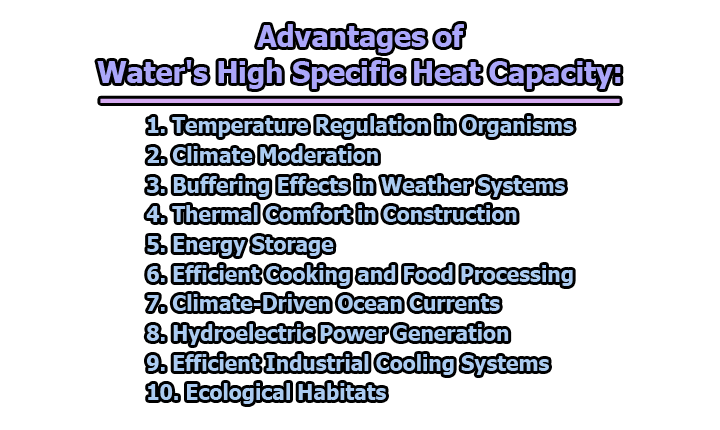Advantages of Water’s High Specific Heat Capacity:
The high specific heat capacity of water, a fundamental property that sets it apart from many other substances, has profound implications for various natural and industrial processes. Here are some of the essential advantages of water’s high specific heat capacity:
1. Temperature Regulation in Organisms: The high specific heat capacity of water plays a pivotal role in maintaining the temperature equilibrium within living organisms. As a major constituent of bodily fluids, water absorbs and retains heat slowly. This characteristic prevents sudden temperature fluctuations in the internal environment of organisms, ensuring that vital biological processes occur optimally. The thermal inertia provided by water allows organisms to withstand external temperature variations, contributing to the overall stability of their internal conditions.
2. Climate Moderation: Large bodies of water, such as oceans and lakes, act as natural moderators of climate due to water’s remarkable specific heat capacity. During the day, these water bodies absorb substantial amounts of solar radiation, and because water heats up slowly, they store this energy. In turn, during the night, the water releases heat gradually, preventing the immediate surroundings from experiencing extreme temperature drops. This moderating effect helps create more temperate climates in coastal regions, influencing the overall weather patterns of surrounding areas.
3. Buffering Effects in Weather Systems: Water’s high specific heat capacity contributes to buffering effects in weather systems, particularly in coastal regions. The slow absorption and release of heat by large bodies of water influence the adjacent land, smoothing out temperature variations. This buffering effect mitigates the impact of temperature extremes, contributing to the creation of more stable and predictable weather conditions. Coastal areas often experience milder temperature fluctuations compared to inland regions, demonstrating the influence of water’s specific heat capacity on local climates.
4. Thermal Comfort in Construction: Urban planning benefits from the thermal properties of water, especially in constructing buildings near large bodies of water. Water’s high specific heat capacity helps regulate the temperature in the vicinity of these structures. During hot periods, the water absorbs excess heat, preventing immediate surroundings from becoming uncomfortably warm. This natural cooling effect contributes to enhanced thermal comfort for inhabitants and workers, showcasing the significance of water in sustainable and comfortable urban environments.
5. Energy Storage: Water’s high specific heat capacity makes it an excellent medium for energy storage, a feature widely employed in solar heating systems. During sunny periods, water can absorb and retain significant amounts of solar energy. The slow release of this stored thermal energy during cooler periods, such as at night, provides a continuous and reliable source of heat. This energy storage application showcases water’s potential as a sustainable and efficient means of harnessing solar power for residential and industrial heating purposes.
6. Efficient Cooking and Food Processing: The high specific heat capacity of water is instrumental in culinary practices and food processing. Boiling or steaming food in water requires less energy compared to other cooking methods. Water’s ability to absorb and retain heat ensures even cooking, preventing rapid temperature changes that may negatively affect the quality of the food. This efficiency in heat transfer makes water a fundamental element in kitchens and food industries worldwide, contributing to energy conservation and the production of high-quality culinary products.
7. Climate-Driven Ocean Currents: The specific heat capacity of water plays a pivotal role in the formation of ocean currents, influencing global climate patterns. The Earth’s rotation and the varying distribution of solar radiation result in temperature differences in ocean water. Warm water near the equator, with its lower density, rises, while cooler water at higher latitudes sinks. This movement, driven by the specific heat properties of water, establishes ocean currents that have far-reaching impacts on climate regulation, weather patterns, and marine ecosystems.
8. Hydroelectric Power Generation: Water’s high specific heat capacity is harnessed in hydroelectric power generation. Large bodies of water, such as reservoirs or rivers, store significant amounts of heat energy. This stored thermal energy can be converted into mechanical energy and, subsequently, electricity through the use of hydroelectric power plants. By exploiting water’s capacity to absorb and release heat, hydroelectric power generation provides a sustainable and renewable energy source, contributing to the global pursuit of cleaner and more efficient power production.
9. Efficient Industrial Cooling Systems: Industries worldwide rely on water as a coolant in various processes due to its high specific heat capacity. Water’s ability to absorb and dissipate heat efficiently makes it a preferred choice in cooling systems for power plants, manufacturing facilities, and other industrial applications. This property ensures that industrial machinery operates within optimal temperature ranges, preventing overheating and maintaining the efficiency and reliability of these critical systems.
10. Ecological Habitats: Aquatic ecosystems benefit significantly from water’s high specific heat capacity. Lakes, rivers, and oceans experience relatively slow temperature changes due to the thermal stability provided by water. This stability creates favorable habitats for a diverse range of flora and fauna, allowing aquatic organisms to thrive in environments with minimal temperature fluctuations. The ecological balance maintained by water’s specific heat properties is crucial for the health and sustainability of aquatic ecosystems around the world.
In conclusion, the advantages of water’s high specific heat capacity extend across a wide spectrum of natural and industrial processes, influencing everything from biological systems to climate regulation and energy production. This unique property of water continues to shape our understanding of the natural world and contributes to the sustainable development of various technologies and ecosystems.

Assistant Teacher at Zinzira Pir Mohammad Pilot School and College










